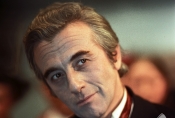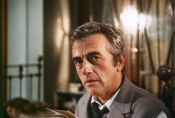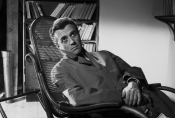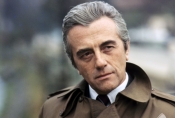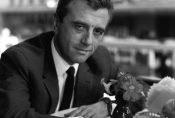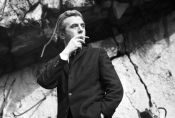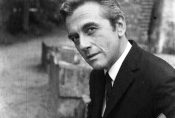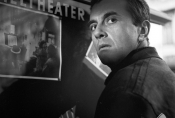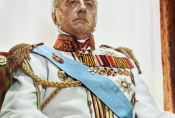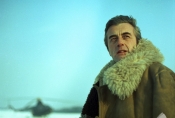Andrzej Łapicki
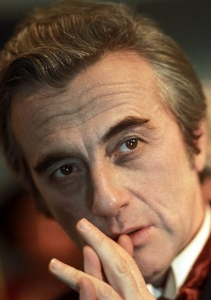
“I can certainly say that film is an unfulfilled area of my career. It has not given me sufficient satisfaction. Apart from Salto, Jak daleko stąd, jak blisko/How Far From Here, And Yet How Close, and several films by Andrzej Wajda (Wesele/The Wedding in particular, as it will always be relevant), I have not found an expression for myself as a film actor in full, I have not become (...) a representative of my generation. Film is a blank sheet for me,” the actor confessed in the magazine “Teatr” (1/1995). Critics and viewers might disagree, however.
He was born on November 11, 1924 in Riga, he died on July 21, 2012 in Warsaw. He studied acting during the war in the clandestine (as it was illegal in Nazi-occupied Poland) State Institute of Theatre Arts. He passed his extramural exams in 1945 and immediately joined the Polish Army Theatre in Łódź (1948-1949)/ Later, he moved to Warsaw, where he performed in several theatres, including Współczesny(1949-1964, 1966-1972), Dramatyczny (1964-1966, 1982), narodowy (1972-1980, 2010), and Polski (1983-1989). He was also a teacher at the Theatre Academy; in 1971-1981, he served as Dean of the Acting Department, and in 1981-1987 and 1994-1996 – as the rector of Warsaw's National Theatre School.
He appeared in over fifty films and television series. He did a lot of voice-over work for the Polish Film Chronicle and numerous documentaries. We hear his voice for the first time in a 1945 documentary by Tadeusz Makarczyński titled Łopuszna, ziemia nieznana/Łopuszna, the Unknown Land; he appeared on screen in person a year later, as a man who carries out a death sentence on a Nazi collaborator in Zakazane piosenki/Forbidden Songs (1946) by Leonard Buczkowski. However, he had to wait for his first starring role nearly 15 years. Jerzy Passendorfer cast him in his movie Powrót/The Return (1960) as “Siwy,” a former Home Army soldier, a participant in the Warsaw Uprising, coming back to the capital in search of old friends, hoping to rekindle old memories. The following year he played another lead role – a young man going through a psychological transformation in the drama that unfolds during the bombing of Dresden – Jan Rybkowski’s Dziś w nocy umrze miasto/Tonight A City Will Die (1961). The director cast him in the leading role in his subsequent films: Spotkanie w Bajce/Café From The Past (1962), Naprawdę wczoraj/Yesterday in Fact (1963), or Sposób życia/Way of Life (1965). He gave an excellent performance (along with his co-stars) in Życie raz jeszcze/Life Once Again (1964) by Janusz Morgenstern; set in the first post-war years, it is the dramatic story of three people who are close to one another – an ardent communist (Tadeusz Łomnicki), a Polish RAF pilot (Andrzej Łapicki), and a youth activist (Ewa Wiśniewska).
He played interesting roles in films by Konwicki: the drunkard Pietuch in Salto (1965), Andrzej – the protagonist of Jak daleko stąd, jak blisko/How Far From Here, And Yet How Close (1971), and the Tsar in the Senator’s dream in Lava (1989). To a large extent, these roles correspond to his performances in films by Andrzej Wajda. In Wszystko na sprzedaż/Everything for Sale (1968), he also played Andrzej, a film director, who makes a film by the same title, portraying his friends, mixing fiction with true events. Wajda usually directed adaptations of literary works. This time he wrote the script, inspired by the tragic death of Cybulski, himself. Łapicki often appeared in Wajda's films: in Wesele/The Wedding (1972), he played the Poet, in Ziemia obiecana/Promised Land (1974) – Trawiński, in Panny z Wilka/The Maids of Wilko (1979) – the doctor, and in Pan Tadeusz – Father (1999).
“As an actor, you can never go beyond yourself. Tadeusz Łomnicki, even when he put on different noses or wigs, screaming, spitting and tearing his guts out, he still remained himself, Łomnicki, the whole time. An actor is an instrument for himself. Steinway is always a piano, even if it makes a slightly different sound depending on who is playing it and what tune” he said in an interview for “Teatr” (12/2008).
Selected filmography
-
1965
SALTO
reż. Tadeusz Konwicki
-
1971
HOW FAR FROM HERE, AND YET HOW CLOSE
reż. Tadeusz Konwicki
-
1972
THE WEDDING
reż. Andrzej Wajda
-
1974
THE PROMISED LAND
reż. Andrzej Wajda
